Benton Harbor's Five Emprees vaulted onto the Billboard Hot 100 in the fall of 1965 with their catchy recording of "Little Miss Sad" despite the fact that the song was issued on a small independent label with limited distribution and promotion. The success of the single was all the more remarkable in that the Five Emprees were forced to change their band name after "Little Miss Sad" was released as the result of an injunction filed against them by a future Hall of Fame vocal group.
The city of Benton Harbor is located in the southwest corner of Michigan, close to the Indiana border and the college town of South Bend. It is separated from its "twin city" of St. Joseph by the St. Joseph River. During the 60's when the members of the Five Emprees were in hgh school, Benton Harbor's population was 19,000. Ron Pelkey delivered papers for the Benton Harbor News-Palladium befoe becoming a founding member of the band. He remembers growing up in a safe environment. During those years, youngsters could ride their bikes anywhere in the city until dark without their parents being concerned.
Unfortunately, Benton Harbor has now become a very different city, struggling with issues of financial mismanagement, unemployment, and crime. Today, the St. Joseph River divides the two cities along racial and financial lines. The 2014 population of Benton Harbor has dwindled to around 10,000 and is almost 90% percent black with the lowest per capita income in the state of Michigan. The city of St. Joseph, on the other hand, has a population that is nearly 90% white and its residents enjoy a median income that is almost three times that of the citizens of Benton Harbor. 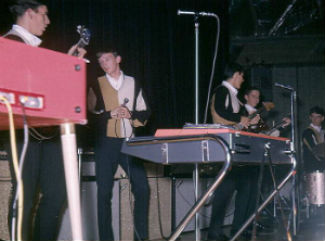 Five Emprees 1965 (L to R) Bill Schueneman, Dan Cook, Ron Pelkey, Tony Cantania, Mike Derose
Five Emprees 1965 (L to R) Bill Schueneman, Dan Cook, Ron Pelkey, Tony Cantania, Mike Derose
Ron Pelkey formed an interest in music early on. His father, Larry, was a musician and played saxophone as a teenager in Pee Wee King's band in Wisconsin. King was most famous for composing the hit songs, "The Tennessee Waltz" and "You Belong to Me". Ron watched his father play on many occasions and that inspired him to take up an instrument. When he was very young, his dad bought him a plastic Gene Autry guitar with nylon strings. The guitar had an interesting feature that allowed you to play four or five different chords, and that started the completely self-taught Pelkey on his way. As his skills gradually improved, he acquired a Spanish guitar and then his first electric model.
An avid rock and roll fan, Pelkey bought 45's at the three independent record stores that were then in business in downtown Benton Harbor. He purchased early platters by Ray Charles, Elvis Presley, Ricky Nelson, and Bobby Rydell and other popular artists first heard on WLS, Chicago's AM giant.
Pelkey's other love was sports. While returning home one evening from a junior varsity basketball game at St. John's Catholic High School, Pelkey mentioned to his friend Mike Derose that he had been playing guitar. Derose had started playing the drums, and the idea to start a band first came to them in the car that night. They were inspired by a popular Benton Harbor band called the Princeton Five. Most of that group was composed of upperclassmen who also attended St. John's.
Both boys were members of the choir at St. John's, and they found a lead singer there in the person of Don Cook who was two years older. The three of them got together during the 1961/62 school year. The first song they put together as a band was Elvis Presley's "Little Sister". After rehearsing ten songs, they made their debut at the 16th birthday party of a classmate named Susan Harris. Their performance in the Harris basement and the applause they received was a rush. They were hooked from that point on.
After playing several school dances without a name, a contest was held at St. John's to come up with a name for the group. Cook and the Chefs was the winner, and it became the moniker that the band used before changing it to 'The Impressions'. 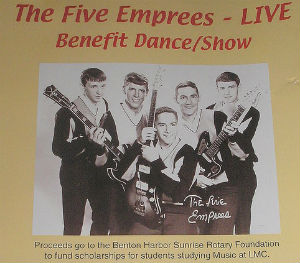 (L to R) Cook, Schueneman, Cantania, Pelkey, Derose
(L to R) Cook, Schueneman, Cantania, Pelkey, Derose
Trying to emulate the Princeton Five, they sought to add more instruments to the line-up. Bill Schueneman was recruited to play keyboards. Schueneman, who was born in Chicago and was a year behind Derose and Pelkey at St. John's, had been taking piano lessons since the 2nd grade. Tony Catania also joined the band around the same time as a second guitarist; and the five young musicians began to jam together regularly in the social room located in the basement at St. John's. Since they didn't have a bass player, Schueneman had to play bass on a Wurlitzer piano with his left hand while fingering the chords with his right.
After Schueneman joined the group, the band started rehearsing in a barn on his family's farm. The Impressions' early set list included tunes like "Donna", "Runaway", and "Let's Dance". Pay was minimal, if any, at these early gigs as the band at his point was just interested in being heard. The very first performance of the new five-man lineup was at a birthday party for Susan Harris' younger sister, Betty Jo. The band's opening number "Little Sister" was apropos since Pelkey soon started dating Betty Jo Harris; and they eventually married nine years later.
Gradually, the band started building a name and began getting calls for other bookings. When the Princeton Five were unable to play at their regular dance at the Berrien Springs Youth Memorial building, the Impressions were called to fill in. Bob Richards, a disk jockey local radio station WHFB-AM, was the MC. Richards was impressed by their performance at the dance and soon called Mike Derose for a business meeting. Since everyone in the band was still a minor, their parents accompanied them. Richards proposed a business venture whereby they and their parents would sign contracts to make him the band's manager and he would set up bookings for them.
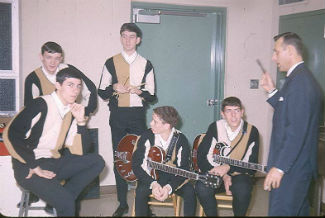 (Back) Cook, Derose (Front) Pelkey, Cantania, Schueneman, and manager Bob Richards
(Back) Cook, Derose (Front) Pelkey, Cantania, Schueneman, and manager Bob Richards
It was probably Richards who clued the band into the fact that Curtis Mayfield's Impressions out of Chicago had already charted three big Pop and R&B hits: "For Your Precious Love", "Gypsy Woman", and "It's All Right"; and that the Benton Harbor teens needed a different name if they ever wanted to record. It was decided to change the band name from Impressions to the 'Five Empressions'; the thinking being that the change in spelling would alleviate any problems. That would not be the case, however, as the band would soon find out.
The regular bookings provided by Richards came with a sacrifice. Schueneman, Derose, and Pelkey all had to quit the St. John's football team because of the conflicting schedules of the band gigs and games. Pelkey was also the captain of the St. John's basketball squad and in order to enable both he and other group members to play that winter, the band gave Richards a St, John's basketball schedule so that he wouldn't book any appearances on game nights.
Bob Richards was a constant source of new music by supplying the band with DJ copies of all the recent releases that were sent to him at WHFB. "Little Miss Sad", a 1964 single by the Addrisi Brothers, was one such 45. Their original recording did not have the distinctive drum sound of the Five Empressions' version, once the Benton Harbor group started incorporating it into their sets. 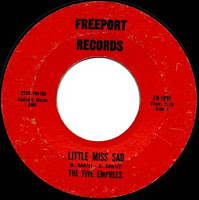
The driving beat of Mike Derose's toms on "Little Miss Sad" was inspired by the Princeton Five who were using the same drum sound on a cover of "Do You Wanna Dance" as well as their very popular version of a Joe Jones' song called "California Sun". Unfortunately for the Princeton Five, they were beaten to the punch by a band from nearby South Bend, Indiana. The Rivieras got to the recording studio first, and they had a national hit when their pounding version of "California Sun" peaked at # 5 on the Billboard Hot 100 in 1964.
During Derose and Pelkey's senior year, Richards arranged for the band to start regular Sunday afternoon dances at a coffee house in downtown Benton Harbor called The Unicorn. It was owned by Dave Gordon who had coached Pelkey in the Babe Ruth baseball league, and the venue could pack in 300 or so teens looking for something cool to do on a Sunday. The band hired Donny Phillips, a WLS Disk jockey, to join them at one of the dances. When he heard them play "Little Miss Sad", Phillips advised them to record it as soon as possible to avoid having another group record it before them.
The band signed with Freeport Records based in Chicago. Richards was the contact with Irv Garmisa, the owner of the small independent label. Richards set up the recording session in the spring of 1965 at Universal Studios located at Walton and Rush Streets in the Windy City. "Hey Lover", a minor hit by Debbie Dovale in 1963, was selected as the b-side. "Running Bear", a cover of the # 1 hit by Johnny Preston, was one of three songs recorded at their first Chicago session. Prior to discovering "Little Miss Sad", the band had announced at a fraternity party gig at the University of Michigan that "Running Bear" would be their first single. 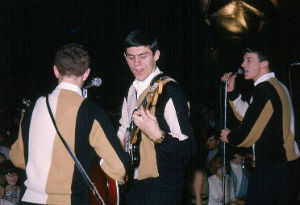 L to R) Cantania, Pelkey, and Cook
L to R) Cantania, Pelkey, and Cook
According to Ritchie Unterberger's artist biography for the Five Emprees on the All Music web site, "Little Miss Sad" was originally released as by the Five Empressions; but their name was quickly changed to the Five Emprees when they were served with an injunction by Curtis Mayfield's Impressions vocal group and their record label ABC-Paramount. The Five Empressions would have to change their name once again to resolve the court action. Schueneman recalled that the band was rehearsing at St. John's Bob Richards told them about the injunction, and that Don Cook came up with the new 'Five Emprees' name on the spot.
Pelkey and Derose graduated in June of 1965, and the next month "Little Miss Sad" started to get airplay on WLS, entering the Silver Dollar Survey at # 33. Part of the band's strategy for promoting their single and getting more name recognition was setting up summer outdoor dances. Dave Gordon signed a contract with a Benton Harbor bowling alley to use part of its large parking lot to set up a series of concerts/dances under the name 'The Other Unicorn'. They constructed a stage at the back of the bowling alley and then put up an eight- foot wooden fence to enclose the area. The makeshift venue could accommodate approximately 3,000 teens.
The band and Richards shrewdly hired WLS disc jockeys to MC the events so that they could get daily ads on the station's See the Stars in Chicago segments, run regularly to promote their DJ's appearances. WLS was an important ally. It was one of the Midwest's top AM stations, and its 50,000 watt clear-channel frequency could be heard over much of the country. WLS also held the distinction of being the first American radio station to play a Beatles' record in February of 1963. They were also the first to chart a record by the band when "Please Please Me" reached # 35 on their Silver Dollar Survey that same month. 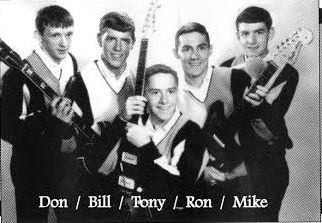
In order to generate as much interest as possible in the Other Unicorn's dances, the Five Emprees booked top-notch headliners including the Kingsmen, Jay and The Americans, the Animals, Neil Diamond, the Hollies, and the Lovin' Spoonful to share the stage at the popular events. The dances ran for two years. Teens were charged $1 if only the Five Emprees played, and $2 if there was a big name guest artist appearing with them.
"Little Miss Sad" charted on Billboard's Hot 100 in 1965, reaching # 74; and it peaked at # 85 on the Cash Box survey. It probably could have been a much bigger single nationally if it would have been distributed and promoted by a larger label. Freeport, however, did not want to share the profits with a lease nor invest the $2,000 needed to hire a company to promote the single. As a result, the 45 stalled somewhat on the national charts despite being on Chicago's WLS' Silver Dollar Survey for almost two months.
The second single was their cover of the Bruce Channel hit "Hey Baby" b/w "Why". Both songs were recorded at RCA's studio on Navy Pier in Chicago. "Why" was a group original that was written at Bill Schueneman's barn and on his father' grand piano in the house. According to Ron Pelkey, the band was unhappy with the session that was run by producer Jerry Ross. He completely changed the arrangement that the band had worked out for "Hey Baby", and they felt that the finished product didn't really sound like the Five Emprees. With Don Cook featured on harmonica, "Hey Baby" debuted on the WLS Silver Dollar Survey in November of 1965, peaking at # 24. It failed to make the Billboard Hot 100, however, and it would also be the band's last single to chart on WLS. 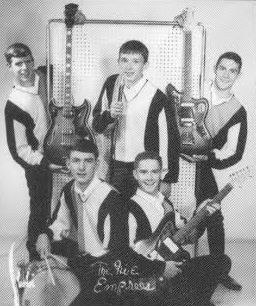 (Top) Schueneman, Cook, Pelkey (Bottom) Derose, Cantania
(Top) Schueneman, Cook, Pelkey (Bottom) Derose, Cantania
In hindsight, it seems that the Five Emprees should have issued "Running Bear" as the b-side of the first single and then put out "Hey Lover' as the a-side of the follow-up. Ron Pelkey's opinion was that "Hey Lover' was a better recording than "Little Miss Sad"; and this is backed up by the fact that "Hey Lover" was the more popular of the two songs with their fan base in Benton Harbor.
Freeport wanted to put out an album quickly to ride the success of "Little Miss Sad", so sessions were again booked at Universal Sounds in Chicago on a Saturday morning. This conflicted with Bob Richards' regular radio program so the band went to Chicago without him. They went through seven songs they knew in one marathon session and then planned come back later to put bass on the recordings. That never happened, and the "The Five Emprees Singing Little Miss Sad and Other Hits" album was rush-released at the end of 1965. The album included the five songs recorded at the band's first two sessions along with the seven cuts the band felt were incomplete. Despite its drawbacks, the LP was the 'Featured Album' on WLS on December 3,, 1965, and It ended up being the only album ever issued by Freeport Records.
Having a hit record meant more gigs getting booked at locations far from their home base. Pelkey remembered that on one occasion they were unable to make it back to Benton Harbor to play at one of the Other Unicorn dances because they had been booked for a gig north of Green Bay, Wisconsin, on a Saturday night. They hired a then unknown band from Chicago called The Buckinghams to take their place. The following year, those same Buckinghams would have a # 1 hit single with "Kind Of A Drag" on USA Records.
The Five Emprees played a memorable gig in support of their big hit at the Wisconsin State Fair with The Gentrys ("Keep On Dancin'") and Paul Revere and the Raiders. Pelkey said it was an amazing experience as he watched girls fainting in the audience so they could go backstage and have Mark Lindsay hold their hand. He also remembered that the Gentrys went on first and used the Five Emprees' equipment. The Gentrys' drummer beat the drums so hard that the snare was very loose when Mike Derose went onstage. Paul Revere's Vox organ failed during the show, so the concert was delayed while they got a new one out of the box. Pelkey recalled that Paul Revere and the Raiders put on an awesome show after the interruption.
After the concert, Raiders' drummer Mike "Smitty' Smith wanted to go to a nightclub after the show and the band gave both he and Don Cook (the only member of the band old enough to go into a club) a ride there. That night the Five Emprees stayed at the same hotel on the same floor as the Raiders; and all night long they heard girls screaming in the hallway.
Pelkey remembered another night playing the famous Aragon ballroom in Chicago. They finished their set early enough so that they could have an on-air visit with their friend Donny Phillips, the "East of Midnight" DJ at WLS. On their way down the elevator, they met Frank Sinatra Jr. standing in a tux waiting to go on at the nightclub downstairs from WLS. The band then went down the street for some breakfast and met the Buckinghams (still in their stage clothes) at the restaurant. Pelkey recalled that all the musicians they met during the 60's were pretty much regular guys, just like the Five Empreees.
The Five Emprees' third Freeport single was a cover of "Little Miss Happiness", a song that Bob Richards insisted that the band record. It was originally done by Trini Lopez on his 1965 LP "The Rhythm and Blues Album". Richards apparently felt that it would be a perfect follow-up to their big hit, but the band didn't really like the song and it didn't chart. The b-side, "Over The Mountain", was taken from the album.
The band's next single, "Pretty Face" b/w "Would You Believe", came out of a demo they recorded for a possible radio commercial for Pretty Face cosmetics. "Pretty Face" was a cover of a song originally recorded by Terry Cashman and the Men earlier in 1966. Several other bands also submitted demos to the company, including The Association, who had recently had a big hit with "Never My Love", a song composed by brothers Donald and Richard Addrisi. 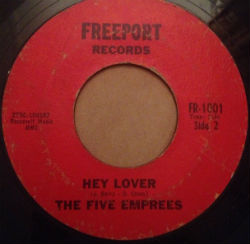
None of the submitted demos ended up being used by Pretty Face cosmetics, and the Five Emprees' recording was the only one released as a single. Although the vocals were done by Don Cook and Ron Pelkey, the instruments were played by session musicians, one of which was Maurice White, later of Earth, Wind & Fire. The b-side, "Would You Believe" was composed in the studio by A&R man Johnny Pate. "Would You Believe" was a popular catch-phrase from the Get Smart television series starring Don Adams.
Freeport re-released "Hey Lover" as the a-side of the Five Emprees' final single for the label in 1966. The b-side was the version of Chuck Berry's "Johnny B. Goode" that appeared on the album. The Freeport label went out of business soon after, and Irv Garmisa arranged for Smash Records, a subsidiary of Mercury Records, to take over the Five Emprees' recording contract.
The band only recorded one single for Smash. The a-side, "Gone From My Mind" was a cover of a single by The Fortunes, a British band that had scored a world-wide hit in 1965 with "You've Got Your Troubles". The b-side was a cover of Marvin Gaye's "Hey Diddle Diddle". Both sides of the single represented a new sound for the Five Emprees with the inclusion of a horn section. The band had invited Rich Oberhue and Steve Zoschke, two horn players who were first chairs in the Benton Harbor High School band, to travel and play with them. 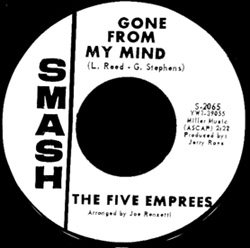
The band suffered a severe bump in the road in 1967 when lead singer Don Cook was drafted. Cook's older brother had been killed in Vietnam, and as a result, Cook found himself stationed in Korea instead of Southeast Asia.
The band found an able replacement for Cook in the person of Benton Harbor native Mike Romeo. With Romeo as lead singer, the Five Emprees signed with GMA Records and recorded a fine cover of Sam Cooke's 1964 hit, "Shake". The recording was done at Sound Studios on Michigan Avenue in Chicago. The session was engineered by Stu Black who had produced hits for the Cryan' Shames and the Ides Of March, and had also worked with another Southwest Michigan band called the Sixth Generation. Despite having a lot of hit potential, "Shake" failed to get airplay on either of Chicago's top stations, WLS or its main rival WCFL.
Frustrated at being unable to get back on the charts, the band re-recorded their big hit "Little Miss Sad" in 1968 on the Gold Standard label with Mike Romeo doing the lead vocals. The chances of lightning striking twice on the same song were remote at best, and the Five Emprees' final release was yet another flop. 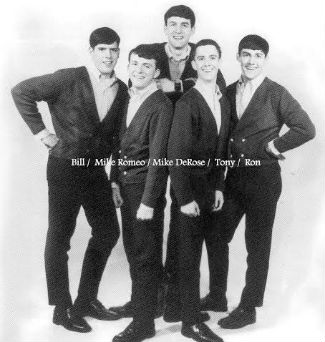
Shortly after their final single was released, Ron Pelkey, Tony Catania, and Mike Romeo were all drafted. The group soldiered on with Schueneman, Derose, the horn section of Oberhue and Zoschke, along with new singer John Tucker and bassist/vocalist Steve Phillips. Pelkey joined the Marine reserves after receiving his notice and only had to serve six months active duty. He returned to the band as guitarist after six months but switched to bass after Catania failed his induction physical and came back on guitar.
This edition of the band changed their name to Midwest. According to Schueneman, they may have been trying to forge a different identity with the new name that better reflected the horn-based direction that their music had taken. No recordings were issued under the name Midwest, however, and the band finally ground to a halt in the early 70's when group leader Mike Derose left the country to study art in France.
Much like the city of Benton Harbor, WLS in Chicago also underwent a significant change for the worse over the years. After being one of the nation's greatest music stations and using its 50,000 watt signal and a host of top DJs like Dick Biondi, Larry Lujack, and Dex Card to deliver the good vibrations of rock and roll songs like "Little Miss Sad" across much of the country; WLS has devolved into a bastion for politically-biased talk shows. The vibrations are now decidedly negative. 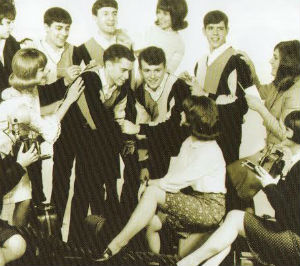 Five Emprees with fans
Five Emprees with fans
During the ensuing years, some of members of the Five Emprees moved to different parts of the country. Ron Pelkey and Bill Schueneman, who had married Pelkey's sister Pam, settled in Georgia. Mike Derose moved to California where he became a highly successful architect and home designer. Don Cook, who married Pelkey's other sister Debbie, along with Tony Catania, and former manager Bob Richards remained in the Benton Harbor area. Mike Romeo died in a tragic industrial accident in 1995.
The Five Emprees reunited for the first time in 1988. Schueneman, Pelkey, Cook, Romeo, and Catania performed at Babe's Lounge in Benton Harbor. They had to hire a drummer because Derose no longer played. Pelkey said that there were 600 people crammed into the venue, and that it was one of the wildest nights that he could remember. Since that first reunion, the band has got together on a fairly regular basis to perform at least one show during the summers in the Benton Harbor area.
The Five Emprees were voted into the Michigan Rock and Roll Legends online Hall of Fame in 2013.
Dr. J. Recommends: "The Five Emprees: Little Miss Sad" CD; Arf Arf Records 2004; Cat. # AA-095.
This is a terrific package of 25 songs that covers all of the singles and album cuts, plus a couple of unrele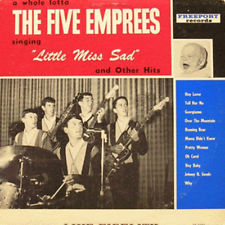 ased tracks recorded by the Five Emprees. The sound is impressive throughout, and the 24-page CD booklet with detailed liner notes by Gary Burns is about as good as it can possibly get for a reissue of a band that had only one hit record. The booklet is filled with photos of the band members, record labels, and chart information. Burns' detailed research on the career of the Five Emprees was a big help in putting together the band bio for the MRRL site.
ased tracks recorded by the Five Emprees. The sound is impressive throughout, and the 24-page CD booklet with detailed liner notes by Gary Burns is about as good as it can possibly get for a reissue of a band that had only one hit record. The booklet is filled with photos of the band members, record labels, and chart information. Burns' detailed research on the career of the Five Emprees was a big help in putting together the band bio for the MRRL site.
Arf Arf is basically a mail order label out of Boston run by musician Erik Lindgren. The company specializes in 60's Garage/Psychedelic Rock.

